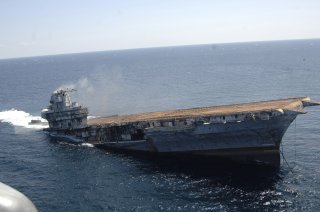Toxic Naval Leadership Can Sink Ships Faster than Missiles
Some things are more dangerous than bombs and kamikazes.
Nearly tainted? Gehres announced that 215 Franklin crewmen would be charged with desertion, and insisted that ships carrying them treat them as prisoners. He founded the “Big Ben 704 Club” to honor the crewmen who had remained on board (and ostentatiously exclude everyone else), barred evacuees from attending the memorial service for fallen shipmates, made sure no evacuee received a medal, and laid the legal groundwork for courts-martial against officers and chief petty officers who took refuge in Santa Fe. (Thankfully the navy leadership ignored his legal maneuvering.) “The treatment of these Franklin crewmen,” concludes Springer, constituted “one of the greatest but least-known injustices involving the U.S. Navy in World War II.”
And how. No bad deed went unrewarded in the case of Leslie Gehres. The navy whitewashed his misdeeds. He was decorated with the Navy Cross, its loftiest award for martial valor, and ultimately promoted to a rear admiral. Here was a navy captain who assumed command of a wounded vessel, shattered its culture, scapegoated his way out of high-seas disaster, and in fact garnered promotions and high honors for his trouble. Many individual Franklin mariners—the ship’s chaplain and one of her engineering officers in particular—displayed conspicuous gallantry following the March 19 cataclysm. Indeed, the flattop is the most decorated U.S. Navy warship ever. Yet this was far from the navy’s finest hour.
This is a story worth telling and retelling. It supplies insight into material matters, along with examples of grit and fortitude. It also supplies a case study in how not to lead. Let’s detoxify the sea service.
James Holmes is Professor of Strategy at the Naval War College and coauthor of Red Star over the Pacific, an Atlantic Monthly Best Book of 2010. The views voiced here are his alone.
This article first appeared in August 2017.
Image: Reuters.

